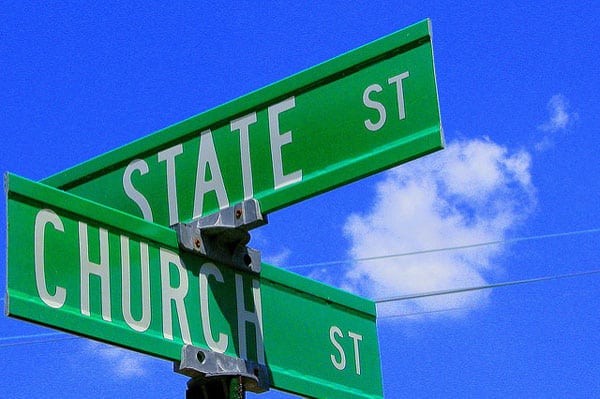
August 21, 2018; Wall Street Journal “Opinion/Commentary” and Sun Journal
Last summer, the Supreme Court ruled in the Trinity Lutheran case that Missouri must provide funds to an otherwise qualified church-sponsored preschool under a program designed to improve playground safety. At the time, NPQ warned that “the repercussions will send ripples through public and parochial school programs across the country.” Now, two new suits have been filed, one in the state of Washington and one in Maine, seeking further easing of the separation between church and state when it comes to school funding.
In Maine, communities that are too small to financially support their own schools provide financial support to families that can be used to pay tuition at other public or private schools. Currently, Maine, based on the need to separate church from state, does not allow those funds to be used for a church-sponsored school. According to Maine’s Sun Journal, the suit filed last week in Bangor’s US District Court challenges this decades-old law. The personal nature of the issue is illustrated by the story of one of the Maine litigants.
[One daughter] “soon will begin her sophomore year at Erskine Academy, and…receive the tuition reimbursement that pays for her education. But their son…is headed into seventh grade at Temple Academy, a private Christian school in Waterville, and the cost of his education will be entirely on them during his high school years.
“It’s a financial burden,” the father said. “We live modest, conservative lives. I’d love to be driving the new vehicles like everybody else, but I choose to give my son a good education.”
The Washington case addresses a program that supports work-study opportunities. According to an op-ed in the Wall Street Journal,
Sign up for our free newsletters
Subscribe to NPQ's newsletters to have our top stories delivered directly to your inbox.
By signing up, you agree to our privacy policy and terms of use, and to receive messages from NPQ and our partners.
[The] state government operates a…program that pays a portion of college students’ wages for part-time jobs, often in fields related to their majors. The program allows students to earn money for school, reduce reliance on student loans, and gain valuable job experience. Students may work for almost any type of employer—public or private, for-profit or nonprofit. Employers the state deems “sectarian,” however, are excluded, no matter what job the student may perform.
From an organizational perspective, the nonprofit community finds itself on both sides of the issue. State funding is a valuable commodity that some church-affiliated organizations desire. Advocacy organizations like the ACLU and Americans United for Separation of Church and State staunchly support a strong wall, while others, like the Institute for Justice, which has provided the legal resources for these two new suits, see the current situation as being anti-religion and in need of change.
Those bringing the new cases see the Trinity Lutheran case going well beyond safe playgrounds; they saw in the Court’s words a challenge to the entire notion of the need to keep church and state separate. Chief Justice Roberts, writing for the Court, maintained that the findings in this case were limited but said “the exclusion of Trinity Lutheran from a public benefit for which it is otherwise qualified, solely because it is a church, is odious to our Constitution all the same, and cannot stand.” Justice Gorsuch, joined by Justice Thomas, challenged whether any line could or should be drawn at all:
The Court leaves open the possibility a useful distinction might be drawn between laws that discriminate on the basis of religious status and religious use. Respectfully, I harbor doubts about the stability of such a line. Does a religious man say grace before dinner? Or does a man begin his meal in a religious manner? Is it a religious group that built the playground? Or did a group build the playground so it might be used to advance a religious mission?
If the walls do come down, there is much to be concerned about. Justice Sotomayor worried in her dissent about maintaining the integrity of religious organizations: “Religion was best served when sects reached out on the basis of their tenets alone, unsullied by outside forces, allowing adherents to come to their faith voluntarily. If this separation [of church and state] means anything, it means that the government cannot…tax its citizens and turn that money over to houses of worship.”
On a more pragmatic basis, spreading public funding over a wider array of schools threatens the ability of our communities to meet their promise to provide a fair and equal education to all students. Religious schools have been largely allowed to set their own standards, establish their curricula, and decide when and how their students should be instructed. If public funding becomes more available, does the public have a right to use the same oversight criteria it uses for its public schools? The fervent opposition that was raised by an attempt in New York to extend government oversight to the religious schools sector suggests the answer is not obvious. Is there a solution that’s not an either/or choice?—Martin Levine











